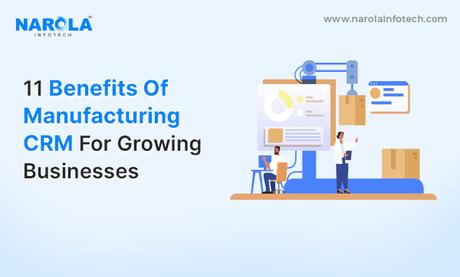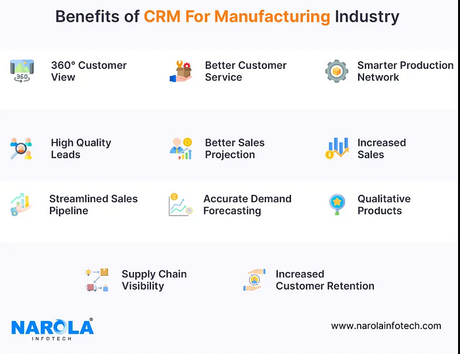
Manufacturing companies like yours must grasp complications to assess market interests. Manufacturing CRM software has a holistic and strategic approach to processes, which is essential for success.
The global manufacturing CRM software market will grow 10.68% annually from 2023 to 2028. The market volume will reach US$131.90 billion by 2028. ClickUp, Thryv, and HubSpot are prominent manufacturing CRMs.
Manufacturing companies are embracing CRM software to optimize operations and increase customer connections. This blog discusses how CRMs may boost manufacturing growth.
We need a new way to plan and manage production and attract additional customers. production CRMs are a strategic and trustworthy solution for managing customer interactions and production processes to expand.

1. 360° Customer View
You can easily access client data by integrating their profile into your manufacturing CRM software . Sales and customer service teams benefit from it. This data helps customers shift from marketing to sales and personalizes their interactions with your firm.
A 360-degree picture of your client's information provides a competitive edge in customer relations and allows you to arrange your manufacturing journey around customer pleasure.
B2B purchases include many parties. A manufacturing CRM prioritizes and organizes connections by engagement and status. Thus, you can maximize opportunities.
Clients today want 24/7 post-sales assistance and excellent care. A good CRM system can handle warranties, repairs, service questions, and client demands. This reduces delays, boosts follow-up purchases, and most importantly, pleases customers.
2. Customer Service Improvement
Improved customer service using CRM solutions is key to customer loyalty. Satisfied customers want to spend more for great brand experiences.
Salesforce reports that 88% of customers value a company's experience as much as its products/services.
Maintaining goodwill requires timely customer service. CRM software centralizes client data, speeding up basic searches. Imagine a client query about warranty claims: a CRM lets support personnel quickly retrieve and convey this data, skipping tedious hold times.
Additionally, CRMs streamline case management, making issue monitoring and resolution easier. They make sure no issue goes unresolved by giving customers a voice.
In the modern world, customer service makes the best experiences. Customer expectations remain high in B2B and Amazon models. A manufacturing CRM is essential to meeting and exceeding these goals.
3. Improved Customer Retention
A manufacturing CRM centralizes and processes vital customer data to improve retention. It provides complete client engagement and preference data. This unified view personalizes every touchpoint. This streamlines departmental communication and provides personalized services.
By recording warranties, service concerns, and inquiries, the CRM improves responsiveness, reduces delays, and strengthens relationships, increasing customer happiness and retention.
95% of Americans feel a company's responsiveness determines their future purchases.
4. Quality Leads
Improving sales procedures attracts valuable leads, not just customers. Even in manufacturing, CRM software is essential for lead management. When searching for distributors or retailers, your sales staff must target high-converting prospects.
A manufacturing CRM tracks targeted lead responses and engagements. Lead scoring helps the system identify and prioritize high-converting connections. With this method, your sales force can focus on the best opportunities, increasing productivity and profitability.
5. Improved Sales Forecast
Like predicting the weather, anticipating future results is difficult in any profession. Luckily, manufacturing CRMs help sales teams with this. A CRM creates a complete database by painstakingly documenting customer orders - what was bought, when, and at what cost. CRMs use these insights and advanced business analytics capabilities to create accurate sales forecasts.
It analyzes client purchase trends during peak and low seasons.
It reports long-term patterns like sales growth or decline.
The systems analyze data to provide accurate sales estimates for strategic planning.
6. Higher Sales
A manufacturing CRM boosts sales by providing customer behavior data that affects sales predictions. Using CRM client purchasing trends gives you a strategic edge. These technologies estimate client peak hours and downtimes based on historical purchases. Your team gets actionable insights on when and what to market using strong big data analytics.
These statistics help your sales staff handle upselling and cross-selling opportunities with exact timing and tailored offerings. Use a customer's peak ordering period to cross-sell and upsell, taking advantage of their readiness to buy. When further purchases meet their needs, sales increase, and value increases.
Nucleus Research concluded that CRM software gives manufacturers a 1.5x ROI.
7. Simplified Sales Pipeline
Knowing the status of your sales pipeline deals is crucial. You'll be wasting time without a CRM to get this vital insight. Spreadsheets are reliable for tracking leads in the pipeline, but they are wasteful, unscalable, laborious, and lack visibility.
A manufacturing-specific CRM streamlines and improves this process. It provides pipeline tools and graphical representations of data for easy consumption. These tools give you pipeline overviews and account-specific studies. You learn each lead's stage and worth.
Additionally, CRM software automates pipelines. Set rules to automatically progress leads through predetermined phases with this functionality. The system can also notify users of milestones and stage changes. Thus, your pipeline is updated, reducing guesswork and assuring smooth progress.
8. Accurate Demand Forecasting
Any firm must manage product scarcity and oversupply. Without good inventory management and forecasting tools, this narrow line is difficult to walk.
Manufacturing CRM software analyzes sales pipelines and provides real-time projections. This vital data illuminates current and future deals. Thus, your teams can plan to effectively allocate production resources.
These predictive capabilities allow manufacturers to quickly meet client requests, giving them a competitive edge.
9. Quality Goods
Maintaining product quality is key to corporate success. Customer happiness and revenue growth depend on it. This requires proactive consumer involvement.
CRM lets you directly collect real-time customer feedback to learn how they view your offerings. A dynamic feedback loop allows quick adjustments and improvements to meet market demands.
10. Supply Chain Visibility
Manufacturing CRM software improves supply chain management. It provides inventory, order processing, operations, warehouse logistics, and distribution chain visibility.
Your teams can make important supply chain choices using real-time data. Consistent material supply simplifies production schedule optimization and speeds product delivery. A useful tool for efficiency and process optimization.
11. Smarter Production Network
Your company may anticipate client demands instead of waiting for requests. Using trustworthy software gives organizations dynamic demand forecasting tools.
CRMs record purchase histories, order dates, and payments for every customer encounter. Custom manufacturing CRM generates accurate sales insights from this data. It accurately predicts sales trends, identifies peak and down times, and analyzes individual buying behaviors.
Emerging industries including technology, electronics, retail, and more need accurate demand forecasting and network management. An integrated production CRM greatly simplifies product development, reducing standbys from concept to market. We advise companies to design collaborative CRM- ERP systems for manufacturing . This is essential for addressing dynamic industry competition.
Adding a manufacturing CRM to your organization boosts lead generation, manufacturing network efficiency, and growth. These tools and solutions must be personalized and well-built to meet your aims and needs.
Narola Infotech excels at unique digital solutions for many sectors. Our team of dedicated professionals has 18+ years of expertise serving clients like you in the US and abroad.
To better understand our work? Check out our past projects.
Contact us if you need a responsive, results-driven manufacturing CRM development partner. Let us create a perfect solution. Our specialists are listening!

